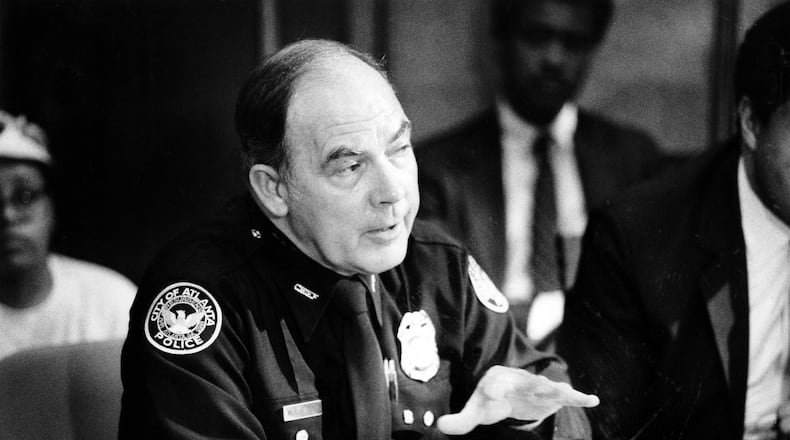A paralyzing panic crept through Atlanta in 1980, as the city’s infamous missing and murdered children case gained victims.
The city created a multi-agency task force and put a white, 22-year veteran officer named Morris Redding in charge. He was then 48 and, unlike some of the figures involved, was self-effacing and not particularly enamored of press conferences.
Redding brought rigorous imperturbability to chaotic environs like the investigation, which was attracting national and international press. He also had a thorough grasp of Atlanta’s character and complex racial relations because of his work on the streets, particularly on Auburn Avenue, then the center of Black social, business and civil life.
“Morris knew everybody and everybody loved him, rich, poor, men, women, Black and white,” said Andrew Young who, as Atlanta mayor would appoint Redding as police chief in 1982. “He was old school-style police officer, who knew and hung out with all the county and city chiefs, the mayors and state legislators, and he was particularly close with Tom Murphy,” the long-time Georgia Speaker of the House.
Morris G. Redding, 88, died March 8 at his home in Stockbridge. According to a family-placed obituary, a private graveside service was held in Thomaston, Georgia. No family members could be reached for comment.
He was born June 21, 1932, in Sylacauga, Alabama, but grew up 113 miles east in Thomaston. He served in the Army, and later joined the Atlanta Police Department in the late 1950s. He graduated from the Woodrow Wilson School of Law in 1962 and the Federal Bureau of Investigation National Academy in 1966.
Early in his career Redding was Mayor Ivan Allen Jr.’s chief security officer and driver. That gave him both access and insight to Atlanta’s rapidly evolving political and racial climate. But in August 1966, it also put him alongside Allen during one that mayor’s most iconic moments during a race riot.
People in Summerhill, just south of the old Atlanta Fulton-County Stadium, flooded the streets after a white police officer shot a Black resident. Within minutes, before many police had arrived, Allen showed up. According to a 2003 Atlanta Journal-Constitution story, Allen turned to Redding, then a captain, and said, “Come on, Morris, you and [aide George Royal]. Let’s walk through this damn thing.”
For nearly an hour, Redding — in uniform — stayed at Allen’s elbow, circulating through the angry mob. Allen at one point scrambled on top of a car and pleaded with the crowd through a megaphone before the mob rocked the car, toppling him. But the riot was at least muted.
Redding was becoming a familiar presence in city and the Black community. Young said for many years Redding worked side jobs providing security for iconic Auburn Avenue businesses the Royal Peacock, the famous Black nightclub; and B. B. Beamon’s Café, a hangout for the Student Non-Violent Coordination Committee and the Southern Christian Leadership Conference.
His sprawling connections made him a natural for the child murder task force which ultimately grew to 102 city, county and state police officers, two dozen FBI agents and a number Georgia Bureau of Investigation agents. They included Vernon Keenan who’d later become GBI director from 2003 to 2019.
“Morris was the progressive type leader who could bring all these different people together,” Keenan said recently. “He was no-nonsense, he wanted absolutely no credit, he just wanted everyone working together.”
The task force eventually arrested Wayne Williams, who was convicted.
“That task force was a high point of the department and of [Redding’s] career,” said retired homicide squad lieutenant Danny Agan. “He testified at the trial, and he signed the search warrants for Wayne Williams’ home. He successfully saw the investigation through, turned it over to the district attorney and it has stood up to years of appeals and reviews.”
Young appointed Redding as chief in 1982.
“We were coming off the [missing and murdered children case], we were having turf wars among gangs in Chicago, Detroit and Miami fighting for control of Atlanta. We were known as the murder capital of the world. I just wanted to change our city’s image,” Young said.
Retired homicide detective Lou Arcangeli said: “Chief Redding brought a great deal of legitimacy and credibility to a department that had been in turmoil for years. To me that’s his legacy. I think Mayor Young understood Morris wasn’t a change agent, but he brought stability. He turned the department into a positive direction and set the stage for Chief [Eldrin Bell] to bring innovation.”
Andrew Young said: “You know, nowadays folks who become police chief want to become mayor, they want to use the job as a stepping stone. That wasn’t Morris. For him, whether on the beat, or chief, policing was a way of life. He was a cop’s cop.”
He retired in 1990.
Redding, according to his obituary, is survived by his daughter, Regina Redding (Martin Smith), of Milton, several sisters and brothers and two grandchildren. According to Redding’s longtime assistant Connie Mann, his wife Imogene Keen Redding died in the 1980s.
About the Author
The Latest
Featured

